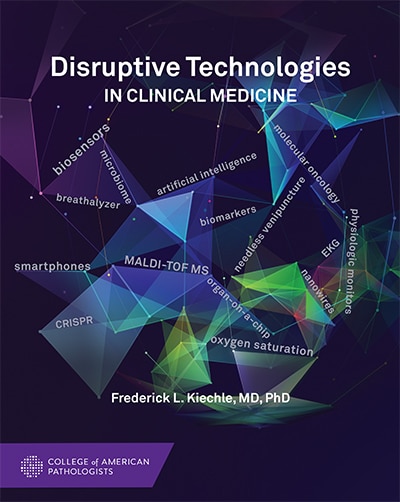April 2024—As the call for fast turnaround of genetic testing results in tumor profiling grows louder, the need for rapid, reliable test methods becomes more pressing. Meanwhile, with new genetic biomarkers emerging at a rapid pace, “everything has tipped the balance toward comprehensive next-generation sequencing analysis,” said Maria E. Arcila, MD.
Read More »Clinical Pathology
A how-to guide to quality management in clinical labs
CAP Publications released this month its newest book, Quality Management in Clinical Laboratories: Optimizing Patient Care Through Continuous Quality Improvement. It is a second edition; the first was published in 2005. Twenty-one contributors cover everything from laboratory staff and informatics to all phases of testing and the laboratory quality management plan.
Read More »In urinalysis, compromises, collections, and rules
March 2024—Reflex criteria, middleware, bladder cancer screening, point of care, controls, and collections came up in CAP TODAY’s Jan. 16 roundtable on urinalysis. Six people weighed in, with CAP TODAY publisher Bob McGonnagle leading. Their take on where things stand and where they can be better follows. CAP TODAY’s guide to urinalysis instrumentation begins here. Tim Skelton, in last year’s ...
Read More »Lab-developed test proposal reflections and predictions
January 2024—The Food and Drug Administration’s proposed rule on laboratory-developed tests would phase out its existing enforcement discretion approach for oversight of LDTs. Instead, the FDA would classify in vitro diagnostics offered as LDTs as class I, II, or III medical devices depending on their risk to patients.
Read More »Phlebotomy program gives lift to lab, community
December 2023—The clinical laboratory at Children’s Hospital of Philadelphia is solving two problems at once: its phlebotomist staffing shortage and the need for some in its community to learn a new skill and obtain employment.
Read More »New guidance in checklist on AMR and mass spec
November 2023—In the 2023 edition of the CAP accreditation program checklists is new guidance on analytical measurement range verification and new and revised requirements for mass spectrometry.
Read More »Many knots to untangle in lab test names
September 2023—Ambiguities, inconsistencies, omissions, and other defects in the naming of laboratory tests can send test orders and results interpretation awry, particularly with some of the most common tests. Even among clinicians and laboratorians working at the same hospital for years, smooth sailing is not guaranteed. The authors of a study published in Archives of Pathology & Laboratory Medicine hope to change that. Their aim is to alert patient-facing providers and laboratories to the risks that ambiguous or nonstandardized laboratory test naming poses and to provide practical rules for minimizing those risks.
Disruptive technologies—what impact on lab workflow?
September 2023—New from CAP Publications is Disruptive Technologies in Clinical Medicine, by Frederick Kiechle, MD, PhD. In his new book Dr. Kiechle says “disruptive technologies offer new paradigms in diagnostic medicine.” Technology-driven disruptions are stimulated by the need to improve patient care, he writes, and they have been “a feature of the practice of clinical pathology since the inception of the first clinical laboratory in 1895 at the University of Pennsylvania, the William Pepper Laboratory.”
Read More »Few but notable— new accreditation checklist changes
August 2023—Climate control, calculation verification, block retention, and histocompatibility section director (technical supervisor) qualifications are among the areas in which laboratories can expect to see revisions in the new edition of the CAP laboratory accreditation checklists, to be released this month.
Read More »The human gut microbiome and blood biochemistry connection
July 2023—The human microbiome has been called the forgotten organ, and at one time it was. But not in the past 10 years. James Versalovic, MD, PhD, made that clear in his talk at the Association for Molecular Pathology meeting last year.
Read More »Reorganize, promote, shift, assess—staying staffed amid a shortage
June 2023—The labor shortage may ease now and then for some laboratories in some areas, but the general outlook is that it will stick around for a while—if not forever.
Read More »Workflow, specimen transport under the lens at AACC
June 2023—Transporting specimens to the laboratory, and processing and distributing them within the lab, will be what AACC meeting-goers hear about in a session next month.
Read More »Kaiser, Geisinger: the first of similar headlines?
June 2023—Consolidation in health care makes the news often. But the coming together of Kaiser Permanente and Geisinger Health and their launch of Risant Health got special attention. CAP TODAY publisher Bob McGonnagle asked Compass Group members for their take on the acquisition when they met online on May 2.
Read More »The intersection of news, core labs, and lab costs
June 2023—As CAP TODAY assembled its annual guides to chemistry and immunoassay analyzers (for this issue and the July issue), publisher Bob McGonnagle brought together IVD manufacturers and lab leaders to talk about consolidation and ever-larger health systems, technology, efficiencies, and centralized and decentralized testing.
Supported? Satisfied? Keeping staff from moving on
May 2023—When hiring is difficult, how to improve retention becomes what it’s all about. Linking sign-on bonuses with performance metrics rather than time in the job is one way to try to retain employees in an industry in which demand for staff far outweighs the supply.
Read More »After negative CT for brain injury, a biomarker gap
April 2023—Traumatic brain injury triage in the emergency department is badly in need of biomarkers—and ones that can change practice. “If biomarkers don’t change practice, they’re a waste of time,” said W. Frank Peacock IV, MD, professor of emergency medicine, vice chair of research, and research director, Department of Emergency Medicine, Baylor College of Medicine.
Read More »Lab leaders on hires, wages, scanners, and storage
April 2023—How is the demand for biomarker tests linked to new oncology drugs playing out in your health system? It is one of several questions laboratory leaders answered in a March 7 Compass Group call led by Stan Schofield, VP and managing principal of the Compass Group and formerly of NorDx/MaineHealth. That and digital pathology and the cost of storage, staffing and wages, the release of results, and the financial implications of the end of the public health emergency were the topics of the day. The Compass Group is an organization of not-for-profit IDN system laboratory leaders who collaborate to identify and share best practices and strategies.
Case review reveals latest on overtransfusion
March 2023—A retrospective study of patients who received blood transfusions at 15 community hospitals found that just over half of the patient encounters reviewed could have been managed without the transfusion of at least one component type, and 45 percent could have been managed without any transfusion.
Read More »Digging deep to drive recruitment and retention
March 2023—All in on staff retention and solving staff shortages, some made worse temporarily by weather. That’s where laboratories were when Compass Group members told CAP TODAY publisher Bob McGonnagle in their Feb. 7 call where hospitals and labs were aiming their efforts. From safety huddles and stay interviews to arranging for overnight stays and incentives, the work to remain sufficiently staffed continues. The Compass Group is an organization of not-for-profit IDN system laboratory leaders who collaborate to identify and share best practices and strategies.
Read More »For those who want it easy, blood draws anywhere
March 2023—The need was always there for some. For others, it’s a matter of convenience. “Home phlebotomy as a concierge service” is how Michael Eller describes what went live in 2019 in New York at Northwell Health, where he is assistant vice president of business development for its laboratories. “It was just a matter of using the capacity we already had in the field and hiring appropriately as needed,” he says.
Read More »Study: Cardiac biomarkers in transgender people
February 2023—Sex hormones, rather than sex assigned at birth, may be a stronger driver of the observed concentration differences between healthy men and women for biomarkers of cardiac disease, say the authors of a study published in JAMA Cardiology (Greene DN, et al. JAMA Cardiol. 2022;7[11]:1170–1174).
Read More »New starts: rapid-molecular pullback, fentanyl screen
January 2023—Respiratory viruses were up in most states when Compass Group members met online Dec. 6 with CAP TODAY publisher Bob McGonnagle, and some were looking to centralize their now decentralized rapid molecular testing. At least one system had already done so. In California, a new law requires fentanyl screening be included in drug screens in all general acute-care hospital lab settings.
Read More »The way forward for prehospital transfusion
December 2022—Ask Leonard Weiss, MD, what his favorite part of his schedule is, and he’s quick to answer that it’s the fieldwork: the helicopter and ambulance dispatches he accompanies once or twice a month as associate medical director of emergency medical services at the University of Pittsburgh Medical Center. Dr. Weiss, who is also assistant professor of emergency medicine and assistant medical director of Pittsburgh’s Stat Medevac service, says one of the UPMC emergency services he strongly supports is the prehospital transfusion of blood products. “Until recently, there wasn’t a lot of evidence to deploy its use on the ground as it is in the air, but thanks to extensive use by the military and scientific evidence of the value of prehospital transfusion,” he says, it is more likely to become part of some hospitals’ emergency medicine programs. The 911 ground-based transfusion program at UPMC and city of Pittsburgh EMS began in 2020. As Dr. Weiss and his UPMC colleagues acknowledge, however, myriad complexities come into play.
Read More »Bright prognosis for brain injury biomarkers
November 2022—The lack of tools for assessing traumatic brain injury has long bedeviled physicians. There’s CT. And then? “This has been an unmet medical need for years,” says Ramon Diaz-Arrastia, MD, PhD, the John McCrea Dickson, MD, professor of neurology and director of the Clinical Traumatic Brain Injury Research Center, University of Pennsylvania Perelman School of Medicine. “As many of us know, it’s one of the major barriers that has hindered clinically advanced development of new therapies in TBI. And I think it’s pretty clear that the clinical evaluation alone leaves a lot to be desired.” “I am always frustrated that we have limited tools,” agrees Frederick Korley, MD, PhD, associate professor and associate chair for research in emergency medicine, University of Michigan Medical School, and scientific director, Massey TBI Grand Challenge, Weil Institute, University of Michigan. That’s now on the cusp of changing. Blood-based biomarkers for brain injury may not be bellying up to the bar just yet, but they are starting to raise the bar for how physicians assess TBI.
Read More »Is apolipoprotein B the best measure of CVD risk?
November 2022—The evidence in favor of measuring apolipoprotein B routinely, with other lipid parameters, is now so overwhelming, says cardiologist Allan Sniderman, MD, that he believes it’s unreasonable to deny patients the advantage of apoB. “If evidence is what counts,” he says, “then the care Americans receive should include apoB.”
Read More »Platelet transfusions: safety, cost, and workflow
October 2022—The jury may no longer be out on whether pathogen reduction of platelet units reduces the risk of a septic transfusion reaction enough to replace culturing of platelet units.
Read More »Sodium measurement—when the method matters
October 2022—William E. Winter, MD, D(ABCC), is blunt about whether to report a corrected sodium: He would worry if his name were on such a report. “I think you have to be careful about formulas,” he said in his “hot topic” talk at the AACC meeting in July.
Read More »Purchased for the pandemic? Rethinking instrumentation
October 2022—Who’s doing what with instruments purchased at the peak of the pandemic? That and next-generation sequencing are what CAP TODAY publisher Bob McGonnagle asked Compass Group members about when they met virtually on Sept. 6. The Compass Group is an organization of not-for-profit IDN system laboratory leaders who collaborate to identify and share best practices and strategies.
As blood supply tightens, so too does mitigation
September 2022—Picture a performer juggling tenpins while walking a high wire, knowing that a hurricane looms. Add a safety net that could disappear at any time. That’s a sense of what hospital transfusion services experience in maintaining enough blood products to meet patients’ needs.
Read More »U.S. blood supply steadier but still short
August 2022—Blood is a precious resource and shouldn’t be treated as a commodity. That’s the consensus in the blood banking community, in line with a longstanding conviction that volunteer donations should remain at the blood system’s core. But as the worst of the pandemic appears to have passed, discussion of blood shortages has increasingly drawn on the vocabulary of commerce, and the warnings about the blood supply have been rife with references to supply chain problems that go beyond the need for more donations. Crises in the blood supply are nothing new, and while the health care system strives to stay prepared, the pandemic threw novel commercial and logistical factors into the mix, in some ways jumbling the expected order of a crisis for blood services. Hospitals scrambled to cope with a surge of COVID-19 patients while the spread of infection caused thousands of blood drives to be canceled, so there was a steep drop in supply of blood products, says Pampee Young, MD, PhD, chief medical officer, biomedical services, American Red Cross.
Read More »Looking for lab staff here, there, and overseas
August 2022—Higher wages help to fill open positions, when they can be offered, but in a labor market that’s as tight as ever, they’re often just a start. That’s why many laboratories are casting wider nets, though the hiring solutions tend to be long term.
Read More »Savings, schedules, new automation—labs weighing it all
August 2022—Running into the reality of staffing. Those are the words of a pathologist who said in the most recent Compass Group roundtable that its health system is making a push to obtain and test specimens “as close to home as possible.” Another Compass Group member said planning is underway for the new hospitals his system is going to build, “but we don’t know where staff will come from.” Here is what they and others told CAP TODAY publisher Bob McGonnagle on July 5.
Read More »Transgender care, in and beyond the lab
July 2022—Gabrielle Winston-McPherson, PhD, could be talking about almost any aspect of laboratory medicine as she recounts how the Henry Ford Health chemistry division, in which she is associate director, has identified a patient care need. She talks about the desire to improve health outcomes. Identifying problems in the preanalytical process. Appropriate test utilization. Putting together a team to develop training material. Assembling data and information prior to implementation. Informatics challenges. And, naturally, the perpetual financial concern of ensuring allocation of limited resources. How else would she—or any other laboratory professional—talk about the lab’s role in transgender health care? In fact, there are many other ways to discuss the topic. “It’s been in the news a lot these days, obviously,” says Matthew Krasowski, MD, PhD, clinical professor and vice chair, clinical pathology and laboratory services, University of Iowa Hospital and Clinics. In fact, there are many other ways to discuss the topic.
Read More »‘A struggle every day’—outpatient center decisions
July 2022—A time of tough choices. A complex dance. This is how Compass Group members on a call with their colleagues, led by CAP TODAY publisher Bob McGonnagle, describe what it’s like to cover outpatient centers amid severe staff shortages. “We are consuming significant resources to get all our locations staffed,” one member says. Another predicts: “We will not be out of this staffing situation for 10 years.” Here is more of what they and others talked about on June 7 as COVID positivity rates were up and monkeypox was in the news. The Compass Group is an organization of not-for-profit IDN system laboratory leaders who collaborate to identify and share best practices and strategies.
Read More »One hospital’s story: Ins and outs of low titer O whole blood use in trauma
July 2022—Myriad questions had to be answered and plans made to put low titer O whole blood in the trauma bay at Thomas Jefferson University Hospital. Julie Katz Karp, MD, associate professor and director of transfusion medicine, reported why, when, and how it was done and where they stand today, in a process she describes as “a never-ending series of hoops.”
Read More » CAP TODAY Pathology/Laboratory Medicine/Laboratory Management
CAP TODAY Pathology/Laboratory Medicine/Laboratory Management















